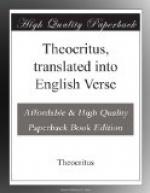Then out they
called: the goatherd marked them, and up came
he;
Then out they sang; the goatherd
their umpire fain would be.
To shrill Menalcas’
lot it fell to start the woodland lay:
Then Daphnis took it up.
And thus Menalcas led the way.
MENALCAS.
“Rivers and vales, a
glorious birth! Oh if Menalcas e’er
Piped aught of
pleasant music in your ears:
Then pasture, nothing loth,
his lambs; and let young Daphnis fare
No worse, should
he stray hither with his steers.”
DAPHNIS.
“Pastures and rills,
a bounteous race! If Daphnis sang you e’er
Such songs as
ne’er from nightingale have flowed;
Then to his herd your fatness
lend; and let Menalcas share
Like boon, should
e’er he wend along this road.”
MENALCAS.
“’Tis spring,
’tis greenness everywhere; with milk the udders
teem,
And all things
that are young have life anew,
Where my sweet maiden wanders:
but parched and withered seem,
When she departeth,
lawn and shepherd too.”
DAPHNIS.
“Fat are the sheep,
the goats bear twins, the hives are thronged with
bees,
Rises the oak
beyond his natural growth,
Where falls my darling’s
footstep: but hungriness shall seize,
When she departeth,
herd and herdsman both.”
MENALCAS.
“Come, ram, with thy
blunt-muzzled kids and sleek wives at thy side,
Where winds the
brook by woodlands myriad-deep:
There is her haunt.
Go, Stump-horn, tell her how Proteus plied
(A god) the shepherd’s
trade, with seals for sheep.”
DAPHNIS.
“I ask not gold, I ask
not the broad lands of a king;
I ask not to be
fleeter than the breeze;
But ’neath this steep
to watch my sheep, feeding as one, and fling
(Still clasping
her) my carol o’er the seas.”
MENALCAS.
“Storms are the fruit-tree’s
bane; the brook’s, a summer hot and dry;
The stag’s
a woven net, a gin the dove’s;
Mankind’s, a soft sweet
maiden. Others have pined ere I:
Zeus! Father!
hadst not thou thy lady-loves?”
Thus far, in alternating strains,
the lads their woes rehearst:
Then each one gave a closing
stave. Thus sang Menalcas first:—
MENALCAS.
“O spare, good wolf,
my weanlings! their milky mothers spare!
Harm not the little lad that
hath so many in his care!
What, Firefly, is thy sleep
so deep? It ill befits a hound,
Tending a boyish master’s
flock, to slumber over-sound.
And, wethers, of this tender
grass take, nothing coy, your fill:
So, when it comes, the after-math
shall find you feeding still.
So! so! graze on, that ye
be full, that not an udder fail:
Part of the milk shall rear
the lambs, and part shall fill my pail.”
Then Daphnis flung
a carol out, as of a nightingale:—




